Playing Away
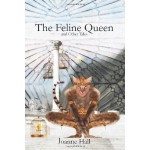
The website of fiction/non-fiction author Colin Harvey

One of the drawbacks of real life when compared to the tidy plotlines of story, is that it refuses to be shaped into any kind of ending, let alone the uplifting ones beloved of Hollywood. When it’s the lives we’re living, where does one fade out, run the credits and play the epic power ballad?
So it is with the series of posts on the blackbirds outside our back door that I’ve been running for the last three or four months.
Last week I reported that Mrs Skanky, widowed, was trying to bring up three chicks on her own. We didn’t know if she’d kill herself in trying, or bring back insufficient food for all three chicks, leaving only one or two to survive, or whether all three would grow to adulthood. What we’d forgotten about is that real life is seldom that conclusive.
For four days it looked as if, against all the odds, she and her chicks were going to prosper.
Then on Friday morning, we heard the sounds of blackbird scolding (and boy, can she scold!) outside the kitchen. Mrs Skanky was sitting high at the top of the hedge, well away from the nest. The nest itself was empty and tipped over.
Kate checked the small bushes at the base of the wall, where a fluffy ball the size of an apple opened its mouth in an obvious ‘feed me’ gesture. Kate righted the nest, scooped up the chick and dropped it back in the nest. A few minutes later Mrs S returned to her now solitary offspring and examined the nest as if to say ‘what the hell happened here?’ We assumed that something, perhaps a cat, perhaps an adult magpie had attacked the nest, but we couldn’t know.
For the next two days she continued to feed the last chick, and then yesterday we looked, and it was empty. We’ve seen Mrs S around; she may have moved the youngster to cover, and hidden him somewhere; we couldn’t find a body, although a predator could have carried him off.
And then yesterday afternoon, I heard a little quiet birdsong from the main flowerbed, on the opposite side of the the garden, some fifty yards from the nest. Mother must have smuggled him out at first light, but there sat the missing chick, with Mrs S in attendance.
This sort of happy ending is that rarity in life, a moment of uplift, so I’ve decided that I’m going to draw a line here under the blackbird saga, because it’s the nearest we get to a happy ending.
The August 2011 edition of The Magazine of Fantasy & Science Fiction is heavier than usual on the science fictional part, with around half the stories -including most of the longer ones- being SF. 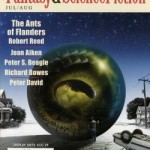
‘Bronsky’s Dates With Death’ by Peter David is the story of an old man who can’t stop talking about death. Bronsky is the ultimate salesman, because he’s perfectly sincere. Just as he’s sold beauty products, vacuum cleaners and anything else that a man can sell, so he sells people the idea that he’s reconciled to death by never stopping talking about it. Initially irritating, then laugh-out-loud funny, and ultimately poignant. Recommended.
Peter S. Beagle’s ‘The Way It Works Out And All’ is a tribute to the late Avram Davidson, and like its hero, the story meanders like few other writers can manage. As evidence of the authors’ skill, take the word “Overneath” which Beagle uses to portray the magical realm through which Davidson shortcuts in his globe trotting – just that one word sums up all the strangeness of the realm, while the story itself is charming, and the circumlocutory style reminiscent of Lafferty at his best, as well as Davidson. Outstanding.
In Rob Chilson’s ‘Less Stately Mansions’ the last member of the Mannheim family continues farming the land in the face of glacier advances, buy-out offers from Earth’s now-independent colonies, and greedy grandchildren scheduling a competency hearing. Infused with the spirit of Clifford D. Simak, it strikes a suitably timeless agrarian feel. Recommended.
In ‘The Ants of Flanders’ by Robert Reed, our world faces the strangest alien invasion since Gardner Dozois’ classic ‘Chains of the Sea.’ But the tone is entirely different, and with Bloch, the six-foot-five sixteen year-old “mental defective” who feels no fear, Reed has written perhaps his most engaging protagonist. As well as terror in the face of the apocalypse, Reed writes of wonder and joy in one of the best novellas of the year; Their driver was barely three weeks older than Bloch and barely half his size, nothing could be more astonishing than the extraordinary luck that had put him in this wondrous place. “I can’t fucking believe this,” said the driver, lifting up on the brake and letting them roll forward. “I’m having the adventure of a lifetime. That’s what this craziness is.”
Joan Aiken’s ‘Hair’ is a splendidly Gothic piece about the widower of a young woman who has burnt out and died too young. It manages to unsettle without ever actually offering any overt threat. Outstanding.
Steven Saylor’s ‘The Witch Of Corinth’ is one of F & SF’s regular excursion’s into historical fantasy, but by depicting the setting in no small detail and combining it with a mystery and a true historical event –the fall of Corinth- it’s a considerably above average of the sub-genre. Recommended.
‘Sir Morgravain Speaks of Night Dragons And Other Things’ by Richard Bowes is a curious Arthurian tale filtered through a science-fictional perspective.
Michael Alexander’s ‘Someone Like You’ isn’t quite up to the standard’s of last year’s ‘Ware of the Worlds,’ or ‘Advances in Modern Chemotherapy,’ but it’s still one of the better time travel stories with a new take on The Grandfather Paradox.
In ‘The Ramshead Algorithm’ by KJ Kabza an inter-reality traveller based on earth comes into contact with his family when his father decides to rip out the hedge which is the basis for his being able to slip between planes.
With Book Reviews by Charles de Lint and Elizabeth Hand and Films reviewed by Lucius Shepard, science from Paul Doherty And Pat Murphy, and humour from Paul Di Filippo, it’s another enjoyable issue, at times edging the sublime.
The word from Robot Towers is that those nice folks at amazon are doing a 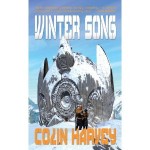 price promotion on Kindle for a range of Angry Robot Books; until August 31st, if you live in the UK and you have a Kindle, you can buy Winter Song for the ludicrously cheap price of 99p a copy.
price promotion on Kindle for a range of Angry Robot Books; until August 31st, if you live in the UK and you have a Kindle, you can buy Winter Song for the ludicrously cheap price of 99p a copy.
And if you want more (why? <g>) there are fifteen other titles you can pick up as well. The full list is available at Angry Robot’s website.
 Regular readers of this blog will know that among the assorted birdlife in our garden, one particular blackbird has staked out his patch. Skanky, whose tattiness belies his formidable powers of reproduction has managed with his wife to produce two, prossibly three broods such as the one pictured, all of which -with the exception of one chick- made it to fledgeling-hood.
Regular readers of this blog will know that among the assorted birdlife in our garden, one particular blackbird has staked out his patch. Skanky, whose tattiness belies his formidable powers of reproduction has managed with his wife to produce two, prossibly three broods such as the one pictured, all of which -with the exception of one chick- made it to fledgeling-hood.
Sadly, Skanky has been MIA for some weeks now. We’ve never seen a body, although by the length of time the greedy little bugger’s been absent, some predator or old age must have got him.
We assumed that another male would move in on Mrs. Skanky, but incredibly, not only has she carried on alone, but she’s laid another clutch of three eggs. Because there’s no mate, we can only assume that they’re Skanky’s Last Hurrah.
The old girl’s trying to rear her new hatchlings on her own, and to be honest, there’s nothing we can do to help, short of making sure that she has a good supply of food laid in, by scattering mealworms within sight of the nest. But we’re really unsure whether she can keep them alive until they fledge…
China Mieville has built a whole career on writing novels that blur genres. Embassytown, his first unequivocal venture into SF, takes the reader to a city on the edge of the universe.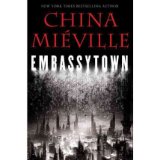
Avice Banner Cho is an immerser, a traveller on the sea of space and time below the everyday, now returned to her homeworld. Here on Arieka, humans are not the only intelligent life, and Avice has a rare bond with the natives, the enigmatic Hosts – who cannot lie.
Only a tiny cadre of unique human Ambassadors can speak Language to the Hosts, and connect the two communities. Then an alien learns haltingly to lie, and is killed by both sides. Hard on the heels of that devekopment, an unimaginable new arrival comes to Embassytown. And when this new Ambassador speaks, everything changes. Catastrophe looms. Avice knows the only hope is for her to speak directly to the alien Hosts. And that’s impossible.
Mieville examines in some detail concepts behind language, in an attempt to create some truly alien aliens – this is something that writers such as Benford have spent years grappling with – and manages to do so without infodumping, using a text packed with neologisms that are just about comprehensible, such as autom and artminds – although floaking eluded me. It’s as if we can only understand one another through a mutual misunderstanding. (p.114)
Mieville dissects both the limitations of language, and the potentialities inherent in something we take for granted, such as a lie. ‘They were yanking it around,’ Bren said. ‘It was impossible for it not to know what they meant; they were shoving it and pointing the same way. They made it obey them. Maybe you need violence for language to take.’
‘Bren,’ I said. ‘That’s crap. We were all running the same way. We were all trying to get out. We had the same intentions. That’s how it knew what we were doing.’
He shook his head. ‘Language` is the continuation of coercion by other means.’ ‘Bullshit. It’s co-operation.’ Both theories explained what had happened plausibly. I resisted, because it felt trite , saying that they weren’t as contradictory as they sounded. (p.454)
Mieville’s characters live in this future, rather than tell us about it, in the same way that major novelists such as Beryl Bainbridge have their characters inhabit the past, rather than lecture their readers, or contemporary novelists just get on with life. Who has time to stop and explain an iPod or a netbook to a stranger?
He demonstrates through such actions such as children’s games (who can run furthest into the alien atmosphere, leave a mark and return) and behaviour at parties (checking on acquaintances bios online) just how it feels to live on this world.
I haven’t felt such a sense of how different -but still [just] comprehensible the future will be since reading Greg Bear’s Queen of Angels almost two decades ago.
The downside for some readers is that it demands far greater concentration to understand what is going on, something that many will not care for. But for those prepared to make the effort, Embassytown is well worth the investment. It also nails any idea that writing fantasy has been a soft option for a writer who couldn’t cope with writing proper SF. It’ll be on the Nebula Ballot at the end of this year, or a major injustice will have been done.
I mentioned a week or so ago that I’d found several copies of my anthology 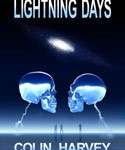 Killers in the loft. I also found two copies of my novel Lightning Days, which went out of print about two years ago.
Killers in the loft. I also found two copies of my novel Lightning Days, which went out of print about two years ago.
Lightning Days was published in 2006 by Swimming Kangaroo Books, and is still one of my favourites amongst my own work. I have no illusions – it’s not perfect, but it takes risks that I wouldn’t countenance today.
It posits a whole range of alternate histories, one major one of which is where the Neanderthals didn’t die out, but instead learned to cross into other alternaties.
If you’re interested in buying one of the two copies I have left, drop me a line via the contact form. DO NOT post in the comments section.
I’ll be back on Friday with the weekly review.
I like to see what other writers are doing on their blogs. Three of my favourite blogs all deal to some extent with the future. (There’s a surprise, I hear you mutter – you’re a science fiction writer.)

Actually, SF is often as much to do with the present, and much though I love the genre I’m not really a scientist.
But Gareth L Powell has a clear view of what may come, and in thi
s excellent post he deals with the implications of a future that looks increasingly influenced by Africa, Asia and Latin America.
Meanwhile, Madeline Ashby is working on various projects involving the futures in media, and is also blogging for Tor about the differences between her fiction and her futurism work.
Charlie Stross is perhaps the pre-eminent blogger in this area and generates more ideas in a couple of weeks than some writers do in a year. Here he blogs about obsolete threats to the world, while here he posts about potential new ones.
 A baker’s dozen of atmospheric stories, half from TTA Press regulars including Nina Allan, Christopher Fowler, Cody Goodfellow, British Fantasy Award winner Joel Lane, Alison J. Littlewood and Steve Rasnic Tem, all wrapped in a haunting Ben Baldwin cover.
A baker’s dozen of atmospheric stories, half from TTA Press regulars including Nina Allan, Christopher Fowler, Cody Goodfellow, British Fantasy Award winner Joel Lane, Alison J. Littlewood and Steve Rasnic Tem, all wrapped in a haunting Ben Baldwin cover.
Dave Hoing is an Interzone regular from TTA’s early involvement with the magazine, but the opening –and closing- story of the anthology, ‘Plainview’ is his first crime story. The opening segment, ‘The Shoe Store’ depicts small–town America 1975; Plainview is archetypically sleepy, so quiet that the sheriff plays finger football with pieces of paper, and the most excitement to be had is that the Farm Expo was coming to the hippodrome in nearby Ridgemont in January. All the latest farm equipment would be on display. When a young girl goes missing, attention focuses on the sleazy owner of the local shoe shop. The second part, ‘The Blood Cools’ which concludes the anthology, is set thirty-four years later and has a very different tone.
Nina Allan’s ‘Wilkolak’ is another of her trademark South East London stories, most recently visited in ‘Silver Wind.’ Kip is an ordinary teenager living in Manor Park who photographs a man he is sure is a paedophile, and becomes increasingly fascinated by the so-called Manor Park Monster; He knew his interest in the monster was growing. He disliked this feeling, distrusted it, but was unable to let it go. He would have liked to have discussed it with Sonia, but was afraid that she might start to think he was weird, one of the lonely serial killer types who bought true crime magazines. Kip has the opportunity to report his discovery, but doesn’t. Utterly compelling.
In ‘The Conspirators,’ by Christopher Fowler, a meeting in one of the new super hotelsof two senior executives and an expensive whore turns deadly serious. Cynical, dryly witty and Highly Recommended.
From a desert to another wasteland for Mikal Trimm’s ‘Who’s Gonna Miss You When You’re Gone?’ Desmond is a thirty-something jailbird living with his parents in abject poverty, in a metal shack in the Florida panhandle whose floor is rusting beneath the family. There are no great surprises about the revelation of Desmond’s family secrets, but Trimm handles his protagonist’s redemption with great sensitivity, and in the end uses the stereotypes in his story to work something marvellous. Outstanding.
As is Richard Butner’s ‘Holderhaven’ which is packed with red herrings; prestignatory former Black Panther members, the restoration of an old house built at the turn of the last century and the revelation of its secrets in a leisurely stroll through history and house alike.
‘Eleven Eleven’ by Cheryl Wood Ruggiero offers a child’s eye view of the symbolism of numbers, a murder, amnesia and revelation, all wrapped in the crypto-logic of childhood: No parents were with her that day, so she assumed that she didn’t have any, which ordinary people have, which was more proof that Alsie was un-ordinary.
Ilsa J. Beck’s terrific ‘Where the Bodies Are’ opens in a wintry Michigan cemetery where the local Jewish population are all buried. Miriam watches from her psychiatrist’s office just across the street; Miriam wasn’t particularly morbid –or Jewish for that matter- and she wasn’t one of those sicko graveyard junkies. Just kept an eye on the place. When her old lover is assigned to the case of a young mother brought into hospital bearing signs of recent childbirth, he and Miriam clash, and they take the first steps toward revelation. Outstanding.
Many of the stories in the book deal with child molestation, abduction and murder. ‘Neighbourhood Watch’ by Cody Goodfellow is perhaps the only one to look at ways of stopping it. Set in a deceptively quiet suburb, the narrator is a retired security guard who, since his wife died five years before maintains a lonely vigil over his neighbours, and shows to what lengths the truly committed will go to protect the innocent.
O’Neil de Noux’s ‘K Love’ is set in New Orleans in the aftermath of Katrina and its lesser known successor Hurricane Rita. Jodie Kintyre of the NOPD finds a ‘jumper’ who has thrown himself off a roof. The suicide note in his pocket tells of a crime he has committed. Despite the snappy dialogue and rich scene setting the story doesn’t really work, reading more as a fragment of a longer piece than a self-contained narrative.
Better is ‘Living Arrangements’ by Steve Rasnic Tem. Now an old man reflecting on his inadequacies as a father, Monte is invited by his daughter Lacey to move in with her family. Monte quickly recognizes new man Pete; Monte had been a guy like Pete, pretty much. Monte guessed if he was healthier, he’d still be a guy like Pete. Pete is a mean drunk, as he demonstrates on Monte, Lacey and grandson Brian one night, but then Lacey unexpectedly offers Monte a shot at redemption.
Prison stories have a long and honourable tradition dating back to Dumas, although Stephen King is probably the chief reason for their resurgence. The latest addition to the sub-genre comes from Alison J. Littlewood, whose ‘4A.M., When The Walls Are Thinnest’ features men driven to seek escape, both from prison and from reality.
Joel Lane’s ‘The Hostess’ extends the theme of ghosts to the literal in this short but chilling tale of a horrific murder in Birmingham in the early 1980s that ends with a clever twist. Highly Recommended.
Luke Sholer’s ‘We Are two Lions’ an assassin agrees to teach his lover his trade, until the pupil begins to eclipse his master; full of twists and double-crosses, it’s clear why Sholer has been Edgar-nominated. The story is as cold and unforgiving as each man’s heart.
Crimewave has established a reputation for high quality crime fiction, sometimes with a hint of the macabre. The ghosts in volume eleven are sometimes symbolic, sometimes literal, but always present. The stories are atmospheric, the settings memorable and the characterization acute. They help make Crimewave Eleven a five-star experience.
 A few weeks ago, while sorting out one of our seemingly perennial comms problems, I ventured up into the loft. There I found three copies of Killers, a limited edition hardback that I edited for Swimming Kangaroo Books back in 2008.
A few weeks ago, while sorting out one of our seemingly perennial comms problems, I ventured up into the loft. There I found three copies of Killers, a limited edition hardback that I edited for Swimming Kangaroo Books back in 2008.
Killers featured several British writers of note; Gary Fry, Paul Meloy, Sarah Singleton all chipped in. As did several Americans, notably Stoker winners Jonathan Maberry and Lee thomas, as well as Nebula and World Fantasy Award winner Bruce Holland Rogers. The anthology was cross-genre, crime stories leavened with one of the branches of speculative fiction – be it SF, fantasy or horror. I’m proud that my own and three other stories received Honorable Mentions in Ellen Datlow’s Year Best Horror.
Swimming Kangaroo printed one hundred copies, and the contributors signed the dust jacket. Now I have three copies to sell, numbers 31, 65 and 99.
Anyone who is interested can e-mail me (do NOT post in the comments section) and send £9.99 by PayPal. In return I’ll send you a copy with a free booklet thrown in.